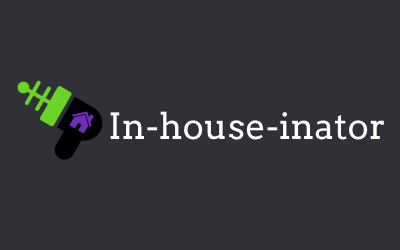The In-house-inator is a Discord bot designed to help faciliate in-house matches for gaming communities. The bot can build teams on the spot using members in voice chat to streamline the lobby-making process. With a robust set of commands available, the In-house-inator is ready for your next LAN party.
📚 Read the commands wiki https://in-house-inator.netlify.app/
🎧 Add to your Discord! Click Here!
The bot folder contains all of the code used to run the Discord bot. The bot is built in Node using the Discord.js library. Additionally, the bot is written entirely in TypeScript.
- Builds in-house teams directly in Discord, no external service needed!
- Can compose teams of scaling sizes with easy-to-input parameters
- Discord embeds create clean message blocks to link to or pin for later
- A cute lil' ray gun logo 🔫
All commands are slash commands! This means they are invoked with /
/team {teams} {players}- Create a team from users in voice channel. Skips deafened users.
/split {teams}- Splits the users in voice channel into even teams. Skips deafened users.
/help- Lists all of the commands available to the in-house-inator It also provides a link to the wiki site for the In-house-inator.
/author- Provides author and metadata creation of the bot. Includes links to the author's website and social links--including Twitter and GitHub.
/version- Shows the bot's latest release.
The site folder contains the project files for the documentation website for the bot. The wiki site is built as a React SPA with React Router. For styling, it uses Chakra UI as a base component library with a custom theme, plenty of custom styles, and styled-components to fill in gaps as needed.
- Dynamically loads in command pages from Markdown files via a custom CMS-like architecture
- Built with modern React Hooks and ES6 Javascript
- Full suite of tests using Testing Library and Jest
- Supports accessibility features and A11y principles
- Fully responsive design for all devices
- Some animations here and there to spruce up the site 👋
- A slick, mad scientist color scheme to charm any -in-ator fanatic 🔬
- The
In-house-inatorbot has to process a LOT of error states for the team seeding process. By allowing the bot to accept user input in the format that I did (simply providing inputs after the base command) it lead to a lot of edge cases to cover. I believe this makes it a more-robust project though as well as more user friendly! - After the
v1.0.0release of the Discord bot, I decided to build the companion wiki site to supplement the!in helpcommand. During this process, I rolled the two repositories into a single mono-repo. This proved to cause some headaches during the deploy process for both Netlify and Heroku. Netlify can be fixed simply enough via a nativenetlify.tomlconfig file to specify a new source folder. For Heroku, I needed a more comprehensive solution. I went with a Git subtree for thein-house-inator-botfolder. For future reference, the command to push a subtree to heroku is:git subtree push --prefix {project_name} heroku {heroku_branch}- NOTE: with the
v3.0.0release the bot is no longer hosted on heroku.
- Chakra UI is a FANTASTIC component and UI library and one I will definitely be recommending in the future. An oversight on my end is that Chakra UI components do not feature much support out-of-the-box 📦 for animations. In order to make effects like my hand-waving invite button on the home page work, I had to spin up some styled-components in place and integrate them with the Chakra UI theme ecosystem. Overall, I think it worked great! Something to keep in mind for future projects though are options like React Transition Group or react-spring would be more comprehensive solutions.
Feel free to message me with questions, comments, or improvements for the bot!
Riley Abrahamson
Website: https://www.rileyabrahamson.com/
Twitter: @RileyAbrahamson
GitHub: RileyAbr
